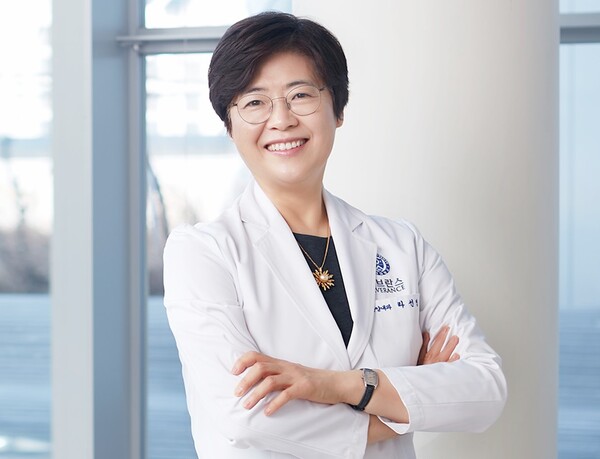
Keytruda (pembrolizumab), an anti-PD-1 immuno-oncology drug for gastric cancer, is about to expand its indications in Europe based on global phase 3 clinical trials led by Korean oncologists.
Keytruda experienced difficulty expanding its indications for stomach cancer due to previous clinical failure. So, if the trial succeeds this time, it will likely serve as an occasion to reaffirm the status of Korean medical experts leading the treatment of gastric cancer, medical sources said.
Recently, the European Medicines Agency's (EMA) Committee for Medicinal Products for Human Use (CHMP) recommended approval of Keytruda in combination with fluoropyrimidine and platinum-based chemotherapy for the first-line treatment of locally advanced or metastatic HER2-negative gastric or gastroesophageal junction (GEJ) adenocarcinoma that is PD-L1 positive (CPS ≥1) and inoperable.
The CHMP is the Korean equivalent of the Central Committee for Medicinal Products for Human Use, an advisory body to the Ministry of Food and Drug Safety. Its recommendations typically lead to a decision by the European Commission (EC), giving Keytruda the green light to expand its gastric cancer indication. A final decision on expanding Keytruda's gastric cancer indication will likely be made in the fourth quarter of this year.
Notably, Korean physicians conducted the global phase 3 trial that led to the CHMP recommendation.
In the KEYNOTE-859 study, Keytruda demonstrated clinical utility in patients whose tumors expressed PD-L1 (CPS ≥1), with a statistically significant improvement in overall survival (OS) in combination with chemotherapy compared to chemotherapy alone.
Rha Sun-young, professor of medical oncology at Severance Hospital, was the principal investigator of the trial, paving the way for the global approval of Keytruda in gastric cancer.
The success of the KEYNOTE-859 study was additionally significant, given that Keytruda had experienced one clinical failure.
KEYNOTE-062, another global study, evaluated the clinical utility of Keytruda in the first-line treatment of stage IV gastric cancer, but the study failed in 2019.
The KEYNOTE-062 study evaluated Keytruda monotherapy or combined chemotherapy vs. chemotherapy alone. It failed to achieve statistically significant overall survival (OS) and progression-free survival (PFS) improvements compared to the control group in either arm.
It was not until four years later that Keytruda demonstrated its value as a first-line treatment option for stage IV gastric cancer through the KEYNOTE-859 study.
In March, Professor Rha presented the first analysis from the KEYNOTE-859 study at the European Society for Medical Oncology (ESMO) Virtual Plenary.
The data showed that Keytruda, in combination with chemotherapy, demonstrated statistically significant and clinically meaningful improvements in OS, PFS, and objective response rate (ORR) compared to chemotherapy alone.
The primary endpoint, median OS, was 12.9 months in the Keytruda arm compared to 11.5 months in the control arm, a 22 percent reduction in the risk of death, and the secondary endpoint, median PFS, was 6.9 months vs. 5.6 months, respectively, a 24 percent reduction in the risk of disease progression or death.
These OS and PFS benefits were consistent across subgroups, including region, PD-L1 expression, and chemotherapy type, and the Keytruda combination also improved response rate (ORR 51.3 percent vs. 42.0 percent) and duration of response (median DOR 8.0 vs. 5.7 months) compared with chemotherapy alone.
Meanwhile, similar to its competitor Opdivo (nivolumab), Keytruda's gastric cancer indication in Europe will be narrowed to "CPS ≥1" rather than all-comers.
Opdivo, which won approval before Keytruda, did so for the first-line treatment of stage IV gastric cancer based on the same phase 3 study (CheckMate-649) and was approved for all-comers with or without PD-L1 expression in the U.S. and Korea, but for "CPS ≥5" in Europe.
Further analysis of the CheckMate-649 study by PD-L1 expression showed that the magnitude of clinical benefit was more significant in the 'CPS ≥5' group.
At the American Society of Clinical Oncology Annual Meeting (ASCO 2023) in June, Dr. Rha also presented an additional analysis of the KEYNOTE-859 study by PD-L1 expression, which showed that the combination of Keytruda provided statistically significant and clinically meaningful improvements in all endpoints compared to control in patients with CPS ≥1 and CPS ≥10, similar to the overall patient population.
The hazard ratios (HRs) for OS compared to control in the 'CPS ≥1' and 'CPS ≥10' cohorts were 0.74 and 0.65, respectively, which were more expansive than the 0.78 in the overall cohort, suggesting that higher PD-L1 expression was associated with more significant OS improvement. This was also consistent with the secondary endpoints of PFS, ORR, and DOR.
Above all, Professor Rha led the KEYNOTE-859 study, and many Korean patients participated in the trial, increasing the possibility of expanding Keytruda's gastric cancer indication in Korea as quickly as in Europe and the U.S., according to the sources.
Related articles
- Keytruda’s reimbursing attempt for 13 indications fails to surmount 1st hurdle
- MSD Korea applies for reimbursing all 13 indications of Keytruda. Will it lead to a new coverage model?
- [ESMO 2023] Keytruda cements its position as 1st-line treatment for HER2+ gastric cancer
- Korean biotech firms spearhead biosimilar race for MSD's Keytruda as patent expiry looms

